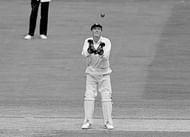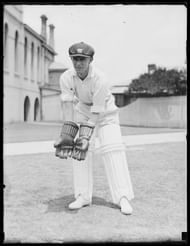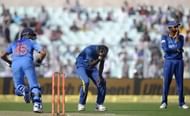
John Benaud never caught the attention as much as his illustrious elder brother did. He was a decent cricketer and a very articulate cricket writer. Prior to the 1999 World Cup final, it was he who first wrote the now famous 'You dropped the World Cup' bit. Frank Keating repeated it the very next day and then it became part of cricket folklore.
'Catches win matches', the age-old adage has proved to be true on numerous occasions. Some of the more famous innings in the history of the game would not have happened if the catches were taken.
Virat Kohli missed a chance offered by Brendon McCullum when the latter was on 9 in the second innings of the Wellington Test in 2014. McCullum went on to score 302, thus denying India a win.
The results of the epic 2005 Ashes series could well have been very different if Shane Warne could hold on to the chance Kevin Pietersen offered when he was on 15 in the second innings of the final Test match of the series. Pietersen went on to add another 143 runs to his score, thus saving the match for England.
The result of the 1997 Ashes series could well have been different if Graham Thrope had managed to take the chance offered by Matthew Elliott, early in the innings. Elliott scored a match-winning 199 which eventually led Australia to a series win.
Australia's famous win in Adelaide in the 2006-07 Ashes series would have probably not happened if Ashley Giles could take the catch of Ricky Ponting when the Aussie skipper was on 35. Ponting went on to add more than 100 runs to set up a memorable victory.
Kiran More dropping Graham Gooch when he was on 36 is still fresh in the memory of the middle-aged Indian cricket fans. Gooch went to add another 297 runs as England won the match easily. Sanjeev Sharma, the unfortunate bowler, didn't play another Test match.
Drop catches have played a role in shaping up the history of the game.
Let's take a look at the most expensive ones in each form of the game.
First-class cricket

Brian Lara hit a purple patch in the 1994 season. The centuries were coming thick and fast, in most matches, he was batting, and Durham's bowling didn't have the sharpness to contain Lara in prime form.
It didn't start well for Lara, though. He was dismissed bowled by his West Indian teammate Anderson Cummins but it was a no-ball. Then, when on 18, wicket-keeper Chris Scott missed Lara's catch off Simon Brown's bowling. Scott, knowing Lara's form, allegedly turned to the first slip fielder and said, " I suppose he'll get a hundred now".
Well, he did. On 497, he was hit on the head by a John Morris bouncer but quickly got up to complete the first five-hundred in first-class cricket's history.
Chris Scott played top-level cricket for over a decade but never became an indispensable member of the team. He always had one or two-year contracts and led the life of a typical insecure county cricketer. He has been, rather, unfortunately, remembered from dropping Lara in this match.
He later became the coach of the Cambridge University cricket team.
The most expensive dropped catch in the first-class history cost the team 483 runs. Mind boggling!
Test cricket

Ben Barnett was a fine wicketkeeper-batsman for Victoria. He visited England in 1934 and South Africa a year and a half later but didn't get a chance to make his Test debut. Only when Bert Oldfield retired, Barnett got the chance to become Australia's first wicketkeeper. He made his debut in the 1938 Ashes series and, in the famous Test match at The Oval, he watched Len Hutton score the world-record breaking 364.
England knew that they could not regain The Ashes but they could draw the series with a win in the final Test. Wally Hammond won the toss and had no hesitation in batting first on what appeared to be a flat deck. Hutton started confidently and had scored 39 when lunch was taken on the first day. In the second over after lunch, with the score on 91, Hutton stepped down the wicket to drive 'Chuck' Fleetwood-Smith through the covers. The ball spun past his bat but Barnett, behind the stumps, too was beaten by it.
The chance was gone and Hutton was not one to give many more opportunities. He scored 364 and helped England win the match by an innings and plenty of runs.
Ben Barnett's mistake had cost Australia a staggering 324 runs! He did not play in another Test match as war intervened.
One Day Internationals and List A cricket

Rohit Sharma's love affair with Kolkata and the Sri Lankan bowling is nothing new. There is no better proof of this than the fourth ODI of the series in 2014-15 that was played in the Eden Gardens. India had already pocketed the series by virtue of winning the first three matches.
Virat Kohli won the toss and elected to bat first. In the fifth over of the day, Shaminda Eranga replaced Nuwan Kulasekara after the latter had bowled two expensive overs. In the third ball of Eranga's first over, Rohit, already tied down, tried to have one of the offside fences. He could not connect the ball properly and skied it up to Thisara Perera at third-man. Thisara's fingers were pointed up at the time of contacting the ball and it spilled out of his hands.
Sharma needed that reprieve and slowly found his touch. Once he was back to his fluent best, there was no stopping him. He slaughtered the rather hapless Sri Lankan bowling to all corners of the ground and finished with the world-record score of 264.
Perera's miss cost his team 260 runs in an ODI match! It is the most expensive dropped catch in the history of both ODI and List A cricket
Minor cricket

When Pranav Dhanawade scored his record-breaking 1009, it was reported that he had offered more than 20 chances. The batsman himself said that it w five or six at the most. There was no mention of Dhanawade's score when those chances were missed.
Hence, we would still stick with the dropped chances that helped A.E.J. Collins make 628 runs in an innings in 1899.
Collins was born in India, in a place near Calcutta. His father was in the Bengal Civil Service but died before his young son could join Clifton College in England.
In June 1899, he opened the batting for Clark's House Junior team against the North Town Junior team in the Clifton College ground. Collins batted on four weekdays and on a day in the weekend to score a mammoth 628*. He was still undefeated at the end but had to stop as he ran out of partners.
It was reported that Collins was dropped twice or thrice after he went past 500 but, more importantly, he was dropped at least once even before he had reached his hundred. It has been found that he was first dropped when his score was 50. The reports on a minor match played almost 120 years ago can be dicey but this is the best possible information to be gathered to date.
On the basis of that, the dropped catch cost the North Town team 578 runs!
Collins then came back and took eleven wickets in the match to lead his team to a victory by an innings and 688 runs.
Sadly, he was killed in action in the Great War. He was only 29 at that time.
Follow IPL Auction 2025 Live Updates, News & Biddings at Sportskeeda. Get the fastest updates on Mega-Auction and cricket news
